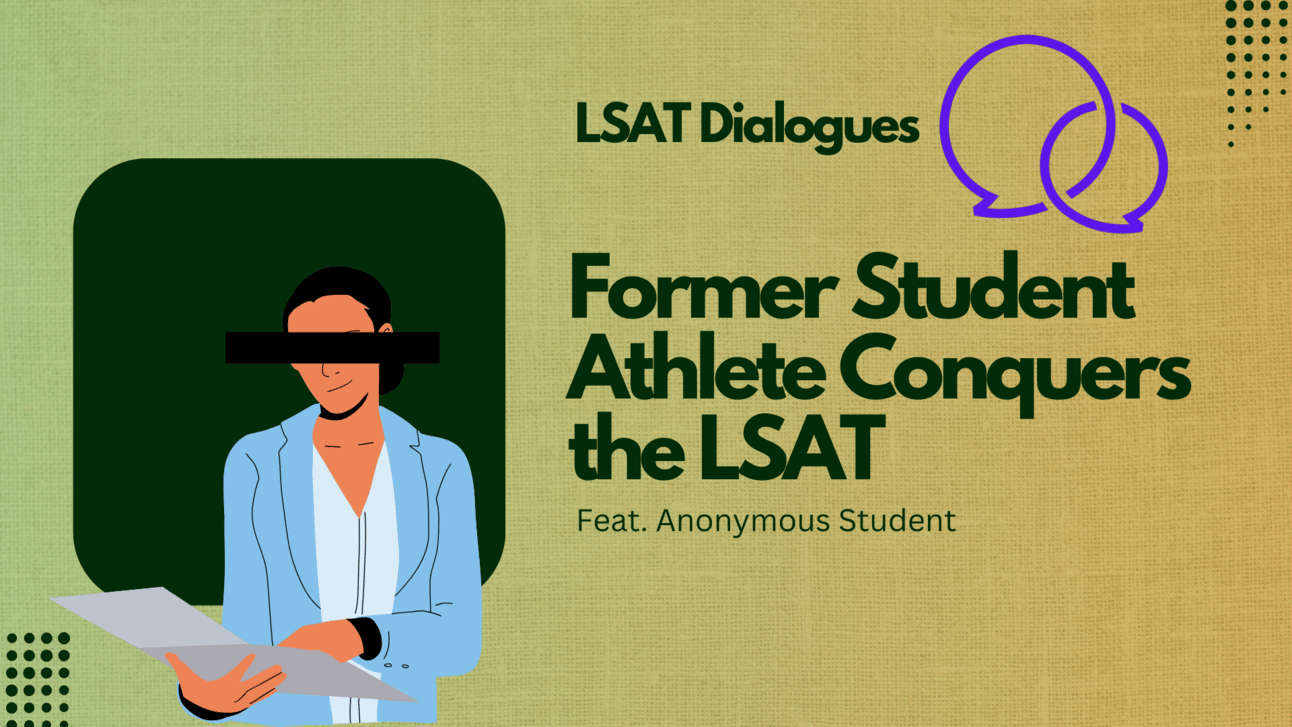- LSAT Dialogues
- Posts
- Student Athlete Conquers the LSAT
Student Athlete Conquers the LSAT
Learning from their approach and mentality

Interview with Anonymous Student
Commentary from Larkin Robson
Helpful Links
About 180 Degrees LSAT
👋 Hi, Welcome to LSAT Dialogues
Hi, I’m Morgan Barrett - thanks for signing up for LSAT Dialogues. If you feel like it, reply to the newsletter and let me know where you are in your LSAT Journey.
Studying for the LSAT and applying to Law School can be a lonely and frustrating experience. Hearing stories from others about what worked (and what didn’t) can make the process better, though.
Today, we chat with an Anonymous Student who left investment banking to become a private investigator before going to Law School. I’ve worked with a lot of student athletes - this student played hockey - and the athlete mentality can be a great help and a bit of hinderance when applied to studying for the LSAT.
Even if you’re not a former student athlete, you can learn a lot from how they navigated the LSAT.
Stats:
175 LSAT
3.67 GPA at top 5 liberal arts school

How did you approach studying for the LSAT?
It was quite intimidating and felt like a lot of pressure because I was making a switch in my career track. I think a lot of people would have just stuck with investment banking and then went into private equity or something. I was worried that if I didn’t do well enough on the LSAT that it would feel like I made a huge mistake. Getting started was very much mental.
I thought I was going to be able to study while working in investment banking – that was ridiculous. Totally unrealistic. I didn’t start studying until I switched jobs. I had six weeks between my banking job and my new job at a corporate investigations firm. I needed a break and some free time to feel like I could get started with studying
At the beginning how many hours a day were you studying?
I treated it like a job but it wasn’t 9 to 5. I approached it like I did hockey. When I was training for hockey as a kid I started out by going down into the basement and firing off 500 or 1000 shots – as many as possible. I wasn’t getting better, though.
I found that 50 or 75 shots, with purpose and focus,was optimal for improvement.
I took that lesson to the LSAT. Quality of studying was more important than quantity. Like I would never do more than one practice test in a day.
Was the progress continuous or did you plateau at a certain point?
I had a point where I was kind of taking a few steps back. That was frustrating. I had some time before my test date, so I took a week off. When I came back, I felt better, less burnt out, and was back to scoring in the 170’s.
The most mentally challenging to process tests were the ones where you felt good and then the score turned out to be a lot lower than you expect. Every time that happened, it was very rattling.
With logic games, what was the big unlock? How did you get to a perfect score almost every time?
It was two things:
1) Making sure I had the foundational stuff down. Like knowing how to represent all the rules. How to consistently set up the different types of games. That stuff.
2) Getting enough reps that I felt confident, even when I didn’t see the deductions or the answers immediately, that I would get there. If I wasn’t seeing the right answer, I wouldn’t panic. Eventually, you do enough games that you start to trust you’ll figure it out.
What did you wish you knew sooner?
It was comforting once I discovered this. It’s a fair test. You don’t have to learn a bunch of tricks. You do well on the LSAT by building skills. And that made it easier to enjoy. I would review a question and think “wow that’s a really good question – they were able to test the subtleties of that concept or argument really well.”
Your girlfriend is now studying for the LSAT – what’s it like helping her?
I try to be explicit about which role she wants me to play. Am I a supportive listener? Or am I giving practical advice? I want to make sure I’m not doing too much of one when she needs the other.
I think communicating that I understand the pressure and the loneliness of studying for the LSAT is very helpful. But if she needs me to discuss some of the strategies for taking the test, I can do that.
Larkin Robson Commentary:
Reading the transcript, I really like a few things this student said.
One is quality over quantity, right? A lot of people kind of go, “oh, man, I'm gonna make this my full time job and study for 40 hours a week.” They're just throwing hours at the wall and it’s not effective. I've had people who study 15 hours a week and then do way better than people studying 40 hours a week. 40 hours - you just get exhausted.
The other thing that he said - I really try to impress upon people, and a lot of people are really resistant to this - is this idea that like the test is fair. It’s not bullshit. This is not “Oh, man, you have to jump through these hoops. Why? F— you! Because you do.”
It really is something where they're testing skills and they're doing it in a legitimate and brilliant way.
There are a lot of things that the LSAC does that detract from that. The whole fiasco that happened with Prometric... it's a lot harder to convince people that, no, the test itself is really good.
I'm biased because I spend so many hours of my life engaging with the test. So I'm going to think that it's interesting, hopefully. But, I think that objectively, it really is interesting. I think that this is the skill that liberal arts schools teach - critical thought. This is this opportunity for students to build that, in this really rigorous, intellectual way.
Also, with this student, it took a while for their confidence to catch up with their skill. That’s quite common. This is a gross generalization, but you can kind of think that the test is testing two different kinds of skill. One is logic and the other is reading. Now out of, let’s say, 100, being the max, the test is testing reading at like an 80. And testing logic at like a 12. You’ve been engaging with English and Reading for 18 years plus. So your English comprehension is way ahead of your logic skills.
But the thing is, is that in logic, even though your skill is so low, because they're testing at such a low level, it's very reasonable to get to a point where then your skill surpasses what they're testing pretty quickly, right?
It's very reasonable to start at, say, like, five. Then throughout your studies, you build your logic skills, to like 20, and they're testing at 16. You're now fine. You're just above what they're testing.
At the beginning, it makes sense that if you’re making a mistake, it’s with logic.
And so once you get really good at this test, scoring in the high 160’s/70s, you are way more likely to make a mistake on the English than you are on the logic.
It’s tough to realize that you’ve advanced skills wise and trust your logic. It takes a bunch of reps.

Larkin Robson
About Larkin
While other tutors and test prep companies try to force students to approach the LSAT using a generic one-size-fits-all schemata, Larkin focuses on each student as an individual, building on the skills and modes of thought they already have. His collaborative and unique approach has yielded big results over the last decade and a half as he routinely helps students get into Harvard, Stanford, Yale and the rest of the T-14 (often with big scholarships).
If you’re feeling stuck or don’t know where to start, reach out.
[email protected]

Morgan Barrett
About Morgan
Morgan Barrett has apprenticed under Larkin since 2018. Since starting as a tutor, Morgan has used Larkin's methods and approach to help students get into Yale, Harvard, Stanford, Columbia, Chicago, Penn, and numerous other top schools, often with large scholarships.
While Morgan has helped students of all experience levels achieve their goals, he specializes in helping students who have a decent grasp of the basics but are feeling stuck. If you've taken a course or self-studied but are struggling to break into the mid 160's or 170's, often Morgan's individualized skill-based approach to the test can provide the catalyst to break through to the next level.